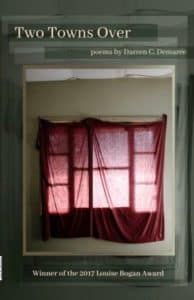Two Towns Over by poet Darren Demaree includes 56 poems, mostly short, but all powerfully aimed at the drug addiction crisis in Ohio and other states. The poems are specific to Ohio; included are several odes to different townships and poems named by towns.
Short poems. Quick reads (you might think; quick and haunting). Devastating images and metaphors.
Opioid addiction is not the first drug crisis America has faced; that mantle belongs to heroin, another opioid, developed in some of the same laboratories as aspirin (and by the same manufacturer). Heroin was even sold as lozenges and pastilles and given to young children. For many years it was broadly available and believed to be addiction-free. Wrong.
The landscape of addiction can look attractive, even beautiful and seductive, something to take the pain away. Then that landscape becomes stark. Transposed poetically to the landscape of Ohio, it becomes even more stark, and deadly.
Sweet Wolf #1

& we’ve put our fingers into the names
of each of them. We’ve dragged
their names up to our faces
& forced them to meet our made-
up world. Sometimes we are given
kisses. Sometimes there is
a great warmth. We know they
are wild. We know there is danger.
We know if we allow the sweet wolf
into our veins it will become
the alpha inside our own bodies
& yet, what a pool to drown in.
The chemicals of each breed
brings a new threat.
There have been so many Ohioans
eaten from the inside out
that I’ve been forced
to re-think exactly what these drugs
are in our world. They are wolves.
We’ve been raised by them.

Darren Demaree
The poems are unrelenting, as unrelenting as the addiction they’re documenting. They move from town to town, township to township, passing the train tracks, the pizza parlors, the grain elevators, and the chain stores, all of those scenes dissolving into what he calls “the burial of the living.”
Demaree is the author of several poetry collections, including As We Refer to Our Bodies (2013), Temporary Champions (2014), Not for Art Nor Prayer (2015), The Pony Governor (2015), Many Full Hands Applauding Inelegantly (2016), A Fire Without Light (2017), and The Nineteen Steps Between Us. He received degrees from Wooster University and Miami University. He is the founding editor of Ovenbird Poetry and managing editor of Best of the Net Anthology, and he’s received 10 Pushcart Prize nominations. He lives in Ohio.
Two Towns Over is social commentary and cultural critique. But it’s also something more. Reading it is like watching a black-and-white documentary of unfolding destruction. It asks the question, how do we stop this? How do we stop?
Photo by Neal Fowler, Creative Commons, via Flickr. Post by Glynn Young, author of the novels Dancing Priest, A Light Shining, and the newly published Dancing King, and Poetry at Work.
__________________________

“I require all our incoming poetry students-in the MFA I direct-to buy and read this book.”
-Jeanetta Calhoun Mish
- Poets and Poems: Beth Copeland and “I Ask the Mountain to Heal My Heart” - July 10, 2025
- A.E. Stallings: the Parthenon Marbles, Poets, and Artists - July 8, 2025
- Poets and Fables: Steven Flint and “The Sun and the Boy” - July 3, 2025

Sandra Heska King says
Oh my word. That link to heroin’s history is jaw-dropping. And how the writer incorporates history in his novels is enlightening–luminous even.
Sweet Wolf #1 is scary. The drugs are wolves, and “we’ve been raised by them.” Yikes.
L.L. Barkat says
The current crisis, has it been brought about by the same dynamic? (I’m thinking it’s related to a prescription drug, yes?)
Which then becomes…
who are the wolves, exactly?
Also, I’m not completely surprised at how this is ravaging “communities,” since many people’s sense of community is quite low (and the consequent loneliness, which is felt literally as physical pain, is therefore at all-time highs—and drugs mask physical pain).
The term “pain-killer” also takes on a terrible irony.
Stopping—such a great question—how do we ever stop anything? What are some of the harder things we’ve stopped, and how have we done it?
Katie says
Good observations and questions on this topic, L.L.
Heard a public service type ad/announcement on radio today with an 800 # for anyone experiencing any addiction to call for help (was in car or would have written the # down). I hope people in need will reach out and take advantage of opportunities such as this. My heart goes out to anyone addicted to anything.